

More Spin on “Internet Addiction Disorder” So you wonder how “Internet Addiction Disorder” is faring these days?
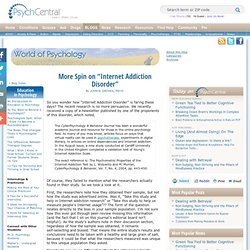
The recent research is no more persuasive. We recently received a copy of a newsletter published by one of the proponents of this disorder, which noted, The CyberPsychology & Behavior Journal has been a wonderful academic journal and resource for those in the online psychology field. As many of you may know, articles focus on ways that virtual reality can be used in psychotherapy, experiments in digital literacy, to articles on online dependencies and Internet addiction. In the August issue, a new study conducted at Cardiff University in the United Kingdom completed a validation test of Young’s Internet Addiction Scale.The exact reference is: The Psychometric Properties of the Internet Addiction Test by L.
Of course, they failed to mention what the researchers actually found in their study. First, the researchers note how they obtained their sample, but not how the study was advertised online. Dr. Internet Addiction and Online Addiction. By John M.
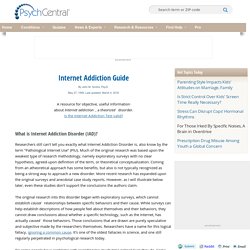
Grohol, Psy.D. May 27, 1999, Last updated: March 4, 2016 A resource for objective, useful informationabout Internet addiction, a theorized disorder.Is the Internet Addiction Test valid? What is Internet Addiction Disorder (IAD)? Researchers still can't tell you exactly what Internet Addiction Disorder is, also know by the term "Pathological Internet Use" (PIU).
The original research into this disorder began with exploratory surveys, which cannot establish causal relationships between specific behaviors and their cause. Do some people have problems with spending too much time online? What most people online who think they are addicted are probably suffering from is the desire to not want to deal with other problems in their lives. What some very few people who spend time online without any other problems present may suffer from is compulsive over-use. Case studies, the alternative to surveys used for many conclusions drawn about online overuse, are just as problematic. The social and psychological impact of online social networking. 2010 National Psychology Week research project Online social networking has proliferated as a communication tool.
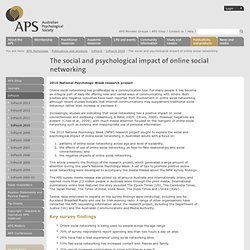
For many people it has become an integral part of daily life offering new and varied ways of communicating with others. Both positive and negative outcomes have been reported from involvement in online social networking, although recent studies indicate that internet communications may supplement traditional social behaviour rather than increase or decrease it. Increasingly, studies are indicating that social networking has a positive impact on social connectedness and wellbeing (Valkenburg & Peter, 2009; Ofcom, 2008). However, negatives are evident (Cross et al., 2009), with much media attention focused on the ‘dangers’ of online social networking such as bullying and inappropriate use of personal information.
This article presents the findings of the research project, which generated a large amount of attention during this year’s National Psychology Week. Resources » Moms Eyes. Dr. GROHOL's Mental Health Page - Review of Caught in the Net. Kimberly S.
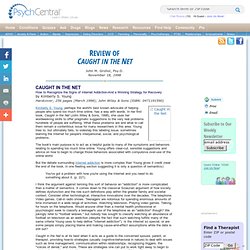
Young, perhaps the world's best known advocate of helping people who spend too much time online, has a way with words. In her first book, Caught in the Net (John Wiley & Sons, 1998), she uses her wordweaving skills to offer pragmatic suggestions to the very real problems hundreds of people are suffering. What these problems are and what to call them remain a contentious issue for many researchers in this area.
Young tries to, but ultimately fails, to sidestep this labeling issue, sometimes blaming the Internet for people's interpersonal, social, and psychological problems. The book's main purpose is to act as a helpful guide to many of the symptoms and behaviors relating to spending too much time online. But the debate surrounding Internet addiction is more complex than Young gives it credit (near the end of the book, in one fleeting section suggesting it is only a question of semantics): And why shouldn't we? People as online Rorschachs!
Hardly an attractive comparison. Psy_Qc_Mars2009_Dossier_03_Sergerie.pdf (Objet application/pdf) Sergerie - UPI - RQP.pdf (Objet application/pdf) Quand l'utilisation d'Internet devient un problème. Comment prévenir l'utilisation problématique des nouvelles technologies ou les ennuis ?
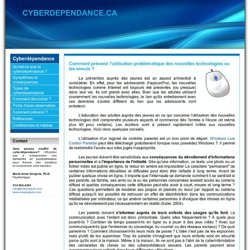
La prévention auprès des jeunes est un aspect primordial à considérer. En effet, pour les adolescents d'aujourd'hui, les nouvelles technologies comme Internet ont toujours été présentes (ou presque) dans leur vie. Ils ont grandi avec elles. Bien que les adultes utilisent couramment les nouvelles technologies, le lien qu'ils entretiennent avec ces dernières s'avère différent du lien que les adolescents vont entretenir. L'éducation des adultes auprès des jeunes en ce qui concerne l'utilisation des nouvelles technologies doit comprendre plusieurs aspects et commence dès l'entrée à l'école (et même plus tôt pour certains).
L'utilisation d'un logiciel de contrôle parental est un bon point de départ. Cyberdependance.ca - Quand l'utilisation d'Internet devient un problème. Colloque cyberdépendance. Plan-conférence-William-Lowenstein-FAPSLN.pdf (Objet application/pdf) Conférence addictions - Hypertechnologisation.